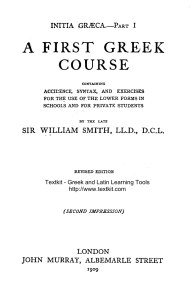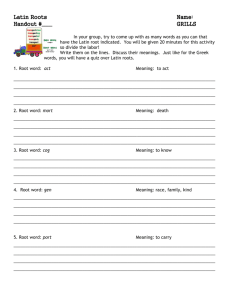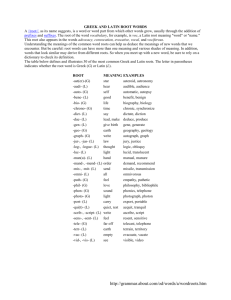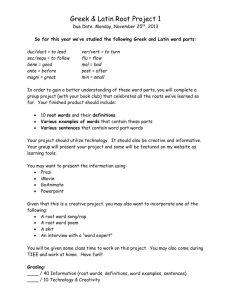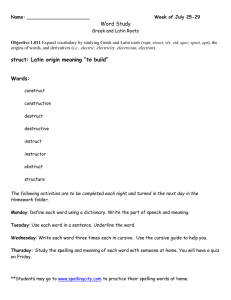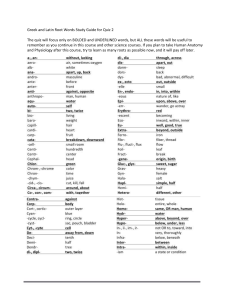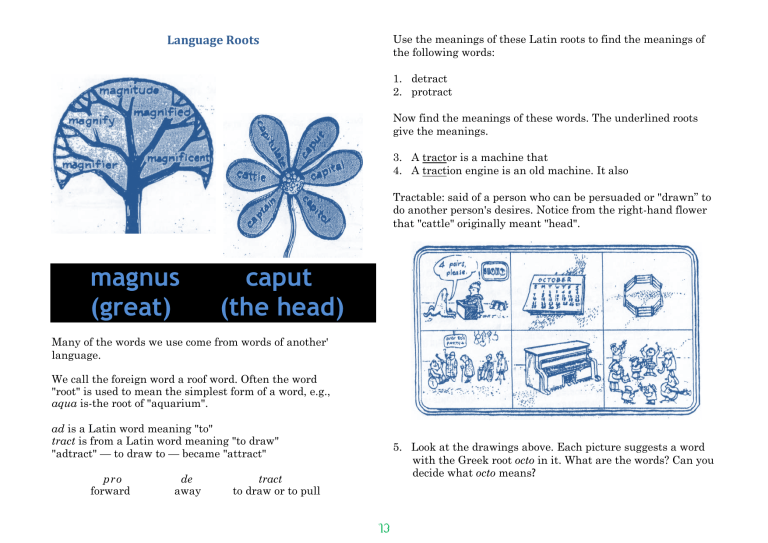
Use the meanings of these Latin roots to find the meanings of the following words: Language Roots 1. detract 2. protract Now find the meanings of these words. The underlined roots give the meanings. 3. A tractor is a machine that 4. A traction engine is an old machine. It also Tractable: said of a person who can be persuaded or "drawn” to do another person's desires. Notice from the right-hand flower that "cattle" originally meant "head". magnus (great) caput (the head) Many of the words we use come from words of another' language. We call the foreign word a roof word. Often the word "root" is used to mean the simplest form of a word, e.g., aqua is-the root of "aquarium". ad is a Latin word meaning "to" tract is from a Latin word meaning "to draw" "adtract" — to draw to — became "attract" pro forward de away 5. Look at the drawings above. Each picture suggests a word with the Greek root octo in it. What are the words? Can you decide what octo means? tract to draw or to pull 13 “unimportant.” Write the reason for your answer. (c) A premier works in parliament. What does the root of “premier” tell you about his job? 6. Several of our words come from the Latin root tenere which means "to hold".'Over, the years the pronunciation, and spelling of tenere have changed. It still means "to hold” but it can be written as “tain”, “tena” and “tinu.” 8. The Latin root bene means “good” or “well.” All four words below begin with the root bene. Write the words and draw lines under the roots. (a) benef ______ : advantage or profit (b) bene ______ r: person who does good or gives money (c) benev _____ t: kindly, well-wishing (d) bened______: a blessing Choose from the four roots given to complete the words below: re ______ (to keep or to hold) con _____ (to hold or include) The next two words are more difficult but they still give the idea of holding something. You will probably have to use a dictionary to complete them — simply look up the first four letters to help you find the answers. tenu ____ (holding a job) tena ____ (one who occupies property for which rent is paid) 9. "Graph" is from a Greek word meaning "write." Match each of the following words with its meaning. (a) autograph: the story of a person's life (b) telegraph: a line drawn to compare one value with another (c) paragraph: a method of sending and receiving messages (d) biography: a section of writing (in a composition, for example) (e) graph: a signature (a written name) 10.The Latin root gratus means "pleasing” or "thankful". Write the following words and underline the roots. Then write what each word means. (a) grateful (b) gratify (c) gratitude 7. The Latin root primus means “first.” Look at the words below. primary prime premier (d) gratuity primitive primeval Base words are English words that can be made larger by the addition of prefixes and suffixes. For example, "help" is the base word of helpful, helpless and unhelpful. If you are able to spot the base word you have-made the word easier to spell (a) Write each word and underline the root. (b) A primate is a clergyman. Do you think that he has an important or and unimportant job in the church? Think about the root and then write “important” or 14 Word Origins Understanding the origins of words helps your reading, vocabulary and spelling. The most common roots for words in English are from the Anglo-Saxon, Greek and Latin languages. Below are some common roots with their meanings and a word that comes from each origin. 1. Anglo-Saxon Latin Greek beoman, to burn (burn) bindan, to tie (bind) brun, brown (brunette) cunnan, to know (can) cyn, family (kindred) gast, spirit (ghost) grafan, to dig (grave) hund, dog (hound) hus, house (household) leaf, consent (leave) mengan, to mix (mingle) nous, to smell (nose) snican, to creep (sneak) tellan, to count (teller) weard, guard (ward) witan, to know (witness) accidere, to happen (accident) altus, high (altitude) amare, to love (amiable) anima, breath, soul (animal) bi, two (bicycle) caput, head (capital) centum, one hundred (cent) com, together (community) corpus, a body (corpse) crux, cross (crucifix) decimus, tenth (decimate) dictio word, saying (dictate) errare, to wander (error) factus, to make or do (factory) femina, a woman (feminine) homo, a .man (homicide) inter, between (intersect) laborare, to work (labourer) locus, a place (locality) magnus, great (magnify) medius, middle (medium) multis, many, much (multitude) numerus, number (numeral) offidium, duty, service (official) plicare, to fold (complicate) primus, first (primal) toxicum, poison (toxic) tri, three (triangle) videre, to see (visibility) vocare, to call (vocation) aer, air (aeroplane) anthropos, human (anthropology) arithmos, number (arithmetic) astron, star (astronomy) athlos, contest (athletics) autos, self (automatic) biblion, book (bible) bios, life (bionic) deka, ten (decade) demos, people (demographics) ergon, work (energy) ethnos, race (ethnic) genes, born (genetics) genus, kind, race (generation) kuklos,wheel (cycle) logos, word (monologue) tnetron, measure (barometer) mikros, small (microscope) twotaos, one, alone (monotone) ortbus, straight, upright (orthodontist) pente, five (pentagon) polis, city (metropolis) polus, much, many (polyglot) skopein, to look at (telescope) theos, god (theologian) Many words are made up of prefixes, root words and suffixes, each of which originated from a different word. 2. autobiography comes from the Greek words auto (self), bios (life) and grapho (writing). Thus autobiography means the writing of a person’s own life. biodegradable comes from the Greek words bios (life), de (down), gradtis (degree) and the Latin able (can be done). Put together, these mean 'capable of being gradually decomposed by living matter, inexplicable comes from in (not), ex (out), plic (folded) and able (can be done). Thus, something inexplicable is not capable of being unfolded or explained. 15 alphabet is a composite of the first two letters of the Greek alphabet, alpha and beta. The connection between the modern meaning of a word and its origin may be unclear, especially where the meaning has changed over time, for example: candidate: from the Latin, candidatus clothed in white. This symbolised the purity and honesty expected of candidates. carnival: from the Latin carnem levo, 'put away meat’. It referred to the time when eating meat during Lent (the time leading up to Easter) was forbidden. Once Lent was over, carnival could commence. Activities A Write down the meaning of the words below that you know. Now work out the others using the Anglo-Saxon, Greek and Latin roots given above. automatic ethnicity monologue warden greyhound astronomy decimal intermediate magnify numerous tricycle witty toxicologist mediate magnificent dictaphone B The words in the first column come from the Greek root grapho, meaning *I write’. Use your knowledge of prefixes and suffixes (and a dictionary if necessary) to match each with its correct meaning. Word autograph graffiti cardiograph geography seismograph graphology biography radiography graphics photography calligraphy Meaning * The study of handwriting. An instrument to measure the movements of the heart. A person’s life story written by another person. A signature, especially of a celebrity. An instrument to measure the force of earthquakes The science of the earth s physical features, resources and populations. Writing, or drawing scribbled, scratched or sprayed on a surface. Technique of producing images using a camera. A style or method of writing. Pictures and diagrams produced by hand or computer. An instrument for recording the intensity of radiation. C Explain the meaning of the following words that come from autos, meaning self or bios, meaning life. You will need to refer to a dictionary automatic: A machine or device that works by itself without human intervention. 1 autocracy 2 autocue 3 auto-immune 4 automation 5 6 7 8 automotive autonomy autopsy auto-suggestion 9 biochemistry 10 bioengineering 1 1 bioethics 1 2 biological 13 bionics 14 biophysics 15 biopsy 16 biorhythm D Find two words that use each of these roots and write their meanings. ology (knowledge) scope (seeing) capere (to take or seize) jurare (to swear) domesticus (household) kosmein (to order, arrange or adorn) E Complete the table using the correct words from this list. official, numerate, magnificent, decimate, astronomy astrum, star decimus, tenth officium, duty or service magnus, great numerous, number the study of the stars to cut down to one tenth of its original number a person in charge absolutely wonderful able to count and perform numerical functions 16
